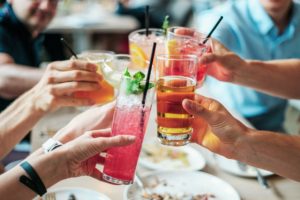 With Dry July just around the corner, it is a perfect opportunity to have a look at our social habits associated with drinking. With many of us choosing to partake in a dry month, it becomes more apparent of our ‘social dependency’ on alcohol.
With Dry July just around the corner, it is a perfect opportunity to have a look at our social habits associated with drinking. With many of us choosing to partake in a dry month, it becomes more apparent of our ‘social dependency’ on alcohol.
Have you ever been at a bar/pub/backyard BBQ and felt awkward and uncomfortable because you are the only one not drinking? In New Zealand we have a large binge drinking culture which has been well publicized. However, we also have a tendency to link alcohol with most of our positive, social experiences. Weddings, Birthdays, after work drinks at an Auckland bar, a casual weekend at your Northland Bach – can you remember a time alcohol wasn’t a part of this? This can make it seem like alcohol is required for us to have a good time, but can also make it difficult to opt out.
Firstly, we should understand what drives our desire to drink while in these situations. Is it to enjoy a glass of wine with dinner, or to “bring you out of your shell”? Is it to numb any thoughts or feelings, or simply because its what everyone else is doing? Understanding the motivation, is the first step of learning how to be comfortable in social situations without the use of alcohol. This can sometimes require a more in-depth approach which can be explored under appropriate guidance from a mental health professional. However here are a few pointers and strategies that can be used to ease that transition into sobriety, even if it is just for one month.
- Know what you would like to drink. Have a favourite drink that you order from a bar (Mocktail, soda etc.). If the event is BYO – take your favourite drink with you, just like you would take your box of beer or bottle of wine. Be confident in what you are ordering or asking for, the language that we use when ordering is important for our perceptions e.g. “I’ll have a sparkling mineral water in a wine glass please” vs “I’m not drinking alcohol anymore…” the negative connotations in our language can transfer to our mood.
- Hold your drink in your hand. When you’re holding your drink, you’re less likely to be offered another, and therefore you can field less of those “why aren’t you drinking?” questions.
- Have an answer ready for those that ask why you aren’t drinking – give as little or as much detail as you are comfortable with but something like “I’m giving it a miss tonight” or “I’m not drinking anymore” is often sufficient.
- Tell your friends and family – they can support you with your decision to not drink and can help keep you on track.
- Understanding yourself and others can be helpful. Watch others and their behavior change with alcohol, consider what influences it has on you and how your behavior and experience of social situations is different. It’s important to remember that alcohol isn’t needed to meet and communicate with people. The more that you do this without the influence of alcohol the easier it can become.
- Enjoy the morning after – notice how great it feels to wake up without a hangover! Use that morning to do something you love rather than nursing a sore head. This is great motivation for the next social gathering that you’d like to skip the alcohol for.
- It gets easier! Know that in time, it will become your new normal. You will get used to communicating and having a great time without the need for alcohol. You’ll find that those that care about you will accept and embrace your choice of sobriety, even if it is temporary.
“Dry July” is just one step in the right direction for a social dependency on alcohol. As a society we’re beginning to recognize that this is an issue and more open and honest conversations are beginning to be had. However, sometimes a more individualized approach is required. If you are concerned about your drinking, or that of someone you care about please seek professional help. If you need to talk about your drinking with a therapist in Auckland, reach out to the team at Shore Therapy. For some alternative resources on managing drinking see https://www.alcohol.org.nz/